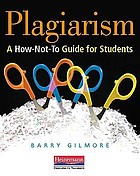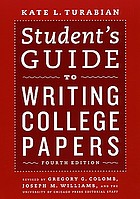Plagiarism is defined as using others’ original ideas in one’s written or spoken work without giving proper credit.
An idea can be:
Trying in good faith to document your academic work, but failing to do so accurately and/or thoroughly
Some students arrive at college never having been taught how to cite sources properly.
Using sites like Chegg or Course Hero to get or share answers or course materials is also considered plagiarism and academic dishonesty.
 Plagiarism: A How-Not-To Guide for Students
by
Plagiarism: A How-Not-To Guide for Students
by
 Student's Guide to Writing College Papers
by
Student's Guide to Writing College Papers
by
Watch this quick 3-minute video to learn what plagiarism is and simple ways to avoid it. Use the chapter list below the video to jump to any section.
Avoid Plagiarizing: You must cite any direct quotation, summary, or paraphrase of any idea or fact from your research. Citing sources is giving credit to the original author and publication where you found the information. Not citing sources is plagiarism and you may be subject to academic discipline.
Lend Authority to Your Paper: By referencing the work of scholars, professionals, and individuals with lived experiences around a topic, you demonstrate that your own research is based on solid, reliable information and that you are capable of critical thinking by being able to synthesize that research into your own.
Provide a Path: By citing sources, you provide the information that readers of your essay or presentation need in order to locate the same sources that you did.
Acknowledge Other's Work: Part of your research is built upon the research of other people. In the scholarship tradition in the United States, it is considered respectful and fair to give them credit for their hard work (just as you might hope someone would give you credit if they were quoting your own work!)